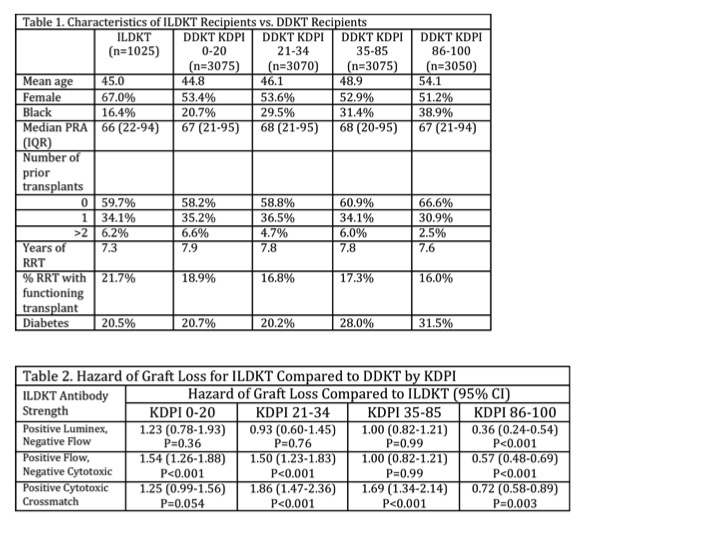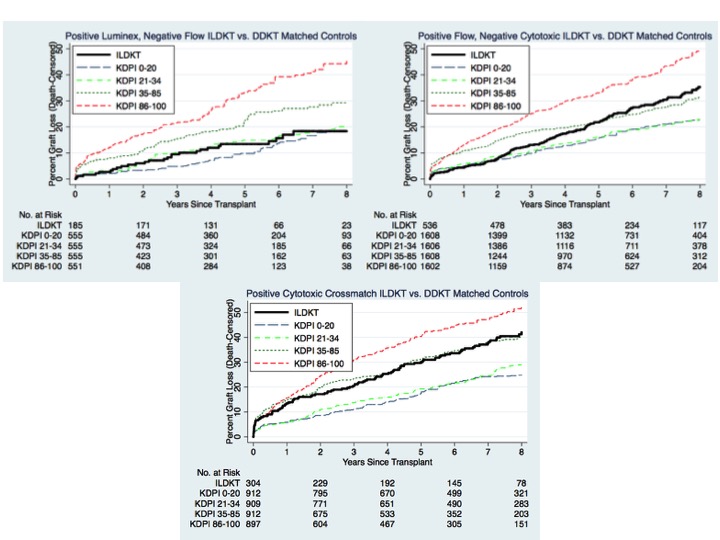Desensitization versus Deceased Donor Kidney Transplantation: What to Choose When Both Become Available?
1UCSF, San Francisco
2Johns Hopkins, Baltimore
3NYU, New York
Meeting: 2017 American Transplant Congress
Abstract number: 103
Keywords: Graft survival, Highly-sensitized, Kidney transplantation, Multicenter studies
Session Information
Session Name: Concurrent Session: Clinical Science: Kidney Immunosuppression: Desensitization
Session Type: Concurrent Session
Date: Sunday, April 30, 2017
Session Time: 4:30pm-6:00pm
 Presentation Time: 4:30pm-4:42pm
Presentation Time: 4:30pm-4:42pm
Location: E354b
Kidney allocation system changes have improved deceased donor kidney transplant (DDKT) access for highly sensitized patients. For patients with a willing live donor but requiring desensitization that receive a DDKT offer, it is unknown if the patient is best served accepting the immediate DDKT offer or pursuing incompatible live donor kidney transplantation (ILDKT).
Using a 22-center ILDKT cohort, we compared graft survival to DDKT matched controls stratified by ILDKT antibody strength and DDKT Kidney Donor Profile Index (KDPI). ILDKTs were matched 1:3 on PRA, age, blood group, previous kidney transplants, race, gender, diabetes, percent of renal replacement therapy with a functioning transplant, and transplant date. Graft outcomes were not different for ILDKT with positive Luminex and negative flow antibody strength and DDKT KDPI<86, though ILDKTs had a survival benefit versus DDKT KDPI 86-100.
Graft outcomes were not different for ILDKT with positive Luminex and negative flow antibody strength and DDKT KDPI<86, though ILDKTs had a survival benefit versus DDKT KDPI 86-100. ILDKT with positive flow and negative cytotoxic crossmatch antibody strength was associated with worse graft survival than DDKT KDPI<35, equivalent outcomes to KDPI 35-85, and improved outcomes compared to KDPI 86-100. There was a trend towards worse graft survival for ILDKT with a positive cytotoxic crossmatch than DDKT KDPI<21, significantly worse survival compared to DDKT KDPI 21-85, and significantly better survival versus DDKT KDPI 86-100.
ILDKT with positive flow and negative cytotoxic crossmatch antibody strength was associated with worse graft survival than DDKT KDPI<35, equivalent outcomes to KDPI 35-85, and improved outcomes compared to KDPI 86-100. There was a trend towards worse graft survival for ILDKT with a positive cytotoxic crossmatch than DDKT KDPI<21, significantly worse survival compared to DDKT KDPI 21-85, and significantly better survival versus DDKT KDPI 86-100.
For highly sensitized patients choosing between ILDKT and DDKT, they should eschew offers for DDKT with KDPI 86-100, regardless of antibody strength. Whether or not to accept DDKT of other KDPI values, depends on the ILDKT antibody strength.
CITATION INFORMATION: Orandi B, Luo X, Garonzik-Wang J, Montgomery R, Segev D. Desensitization versus Deceased Donor Kidney Transplantation: What to Choose When Both Become Available? Am J Transplant. 2017;17 (suppl 3).
To cite this abstract in AMA style:
Orandi B, Luo X, Garonzik-Wang J, Montgomery R, Segev D. Desensitization versus Deceased Donor Kidney Transplantation: What to Choose When Both Become Available? [abstract]. Am J Transplant. 2017; 17 (suppl 3). https://atcmeetingabstracts.com/abstract/desensitization-versus-deceased-donor-kidney-transplantation-what-to-choose-when-both-become-available/. Accessed February 26, 2026.« Back to 2017 American Transplant Congress
